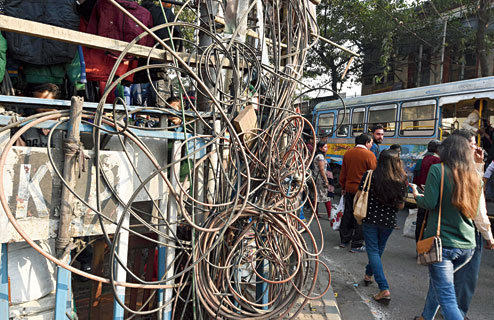
Calcutta: Low-hanging cables are no longer just an eyesore, they are potential killers.
Most of the cable TV and broadband operators who tie their cables around lamp posts without any objection from the civic authorities or a government agency enjoy political patronage. Sources said nobody would dare to tell them to go the underground route, which is safer but labour and technology-intensive.
In any case, Calcutta's underground conduits are already chock-a-block with utilities like water supply, drainage and telephone and electricity lines.
But engineers say a separate channel for cable wiring can be found, provided there is initiative and political will.
Metro had highlighted last August how a mesh of wires dangle overhead on roads across the city and the threat they pose to people. An 18-year-old man died on Monday after his motorbike got entangled in a heap of cables left lying on the roadside.
According to an official in the Calcutta Municipal Corporation (CMC), cables are tied around lamp posts without the civic authorities' sanction. This has been the practice since cable TV came to Calcutta in the early 90s, but there has been no crackdown because the operators usually enjoy the patronage of the political party in government.
"We do not give permission for cabling of this kind. A few years ago, we had tried to pull down some cable TV wires from a lamp post in Park Circus and our workers got beaten up," a CMC engineer recalled.
The city has at least seven multi-system operators (MSO) that transmit TV signals through overhead cables. More than 12 broadband service providers use the same method to reach their customers.
Mayor Sovan Chatterjee said on Tuesday evening that he was unaware of any fatal accident caused by cables left lying on a road. "I am hearing this from you," he told reporters about the death of Mohammad Tausib Alam on the Park Circus bridge.
Overhead cabling is rampant in Kasba, Garden Reach, Jadavpur and Behala, where the mayor lives. "Electrical cables are underground between wards 1 and 100, but in some places in the other 44 wards they run overhead," a CMC official said.
An official of a telecom service provider said a separate underground conduit should be created for telephone, cable TV and broadband. "The civic body must create the infrastructure and recover the money spent on this from the companies that would use this conduit."
Sources said the CMC had held several meetings with cable TV operators on regulating overhead cabling but never gone beyond that.
No crossing or road in the city is devoid of the visual pollution and danger of cables dangling overhead. In front of the Constantia Building on Rawdon Street, there are at least 10 kinds of cables hanging from a lamp post. While passing from one post to another, these cables are within touching distance from the pavement.
The Tipu Sultan Masjid at the Central Avenue-Lenin Sarani crossing overlooks a thick circle of wires dangling from a pole and leaning towards the thoroughfare.
Almost every such maze includes cables transmitting TV signals, broadband bandwidth and even electricity in some places.
Since companies providing Internet or cable TV signals are allowed to compete with each other, there are multiple cables in every junction. "There may be four cables for TV signals and four others for Internet in a single lamp post. Add to this the regular telephone and electricity cables in some places and you have a potentially dangerous mix," said a cable TV operator in Kasba.











